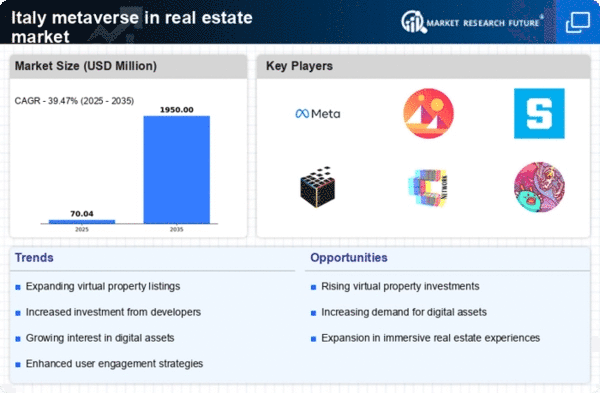The metaverse in-real-estate market in Italy is characterized by a rapidly evolving competitive landscape, driven by technological advancements and increasing consumer interest in virtual properties. Major players such as Meta Platforms Inc (US), Decentraland (US), and The Sandbox (FR) are at the forefront, each adopting distinct strategies to enhance their market presence. Meta Platforms Inc (US) focuses on integrating augmented reality (AR) and virtual reality (VR) technologies to create immersive experiences, while Decentraland (US) emphasizes user-generated content and community engagement to foster a vibrant ecosystem. The Sandbox (FR) leverages partnerships with brands and creators to expand its virtual real estate offerings, collectively shaping a competitive environment that prioritizes innovation and user experience.
The business tactics employed by these companies reflect a moderately fragmented market structure, where localized strategies and supply chain optimization play crucial roles. For instance, companies are increasingly localizing their offerings to cater to regional preferences, which enhances user engagement and satisfaction. The collective influence of these key players is significant, as they not only drive technological advancements but also set industry standards that smaller players may follow.
In October 2025, Meta Platforms Inc (US) announced a strategic partnership with a leading Italian real estate firm to develop virtual properties that mirror real-world locations. This move is pivotal as it not only enhances Meta's portfolio but also bridges the gap between physical and virtual real estate, potentially attracting a broader audience interested in both realms. The collaboration signifies a trend towards integrating real estate expertise with metaverse capabilities, which could redefine property transactions in Italy.
In September 2025, Decentraland (US) launched a new initiative aimed at promoting virtual art galleries and exhibitions, collaborating with local artists and cultural institutions. This initiative is strategically important as it positions Decentraland as a cultural hub within the metaverse, likely increasing user engagement and attracting art enthusiasts. By fostering local talent, Decentraland enhances its community-driven approach, which may lead to increased property value within its platform.
In August 2025, The Sandbox (FR) secured a partnership with a prominent Italian fashion brand to create exclusive virtual fashion shows and digital wearables. This strategic action highlights the growing intersection of fashion and virtual real estate, suggesting that The Sandbox is keen on capitalizing on the lucrative fashion market within the metaverse. Such collaborations could enhance user experience and drive traffic to virtual properties, thereby increasing their market value.
As of November 2025, current competitive trends indicate a strong emphasis on digitalization, sustainability, and AI integration within the metaverse in-real-estate market. Strategic alliances are increasingly shaping the landscape, as companies recognize the value of collaboration in enhancing their offerings. Looking ahead, competitive differentiation is likely to evolve, shifting from price-based competition to a focus on innovation, technology, and supply chain reliability. This transition may redefine how companies engage with consumers, ultimately fostering a more dynamic and responsive market.























Leave a Comment